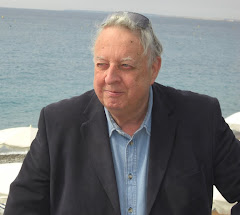Sunday 30 March 2008
Next week I'll be passing through Cherbourg, de la Salle's home town, and I'll think of her fondly. I look forward to her next ten CDs; it would be good to hear her in person some time.
Monday 24 March 2008
Good weekend for important discoveries. Simone Kermes has already been mentioned, but her voice really is addictive. The other discovery was the cellist, Jamie Walton in the Elgar and Myaskovsky cello concertos (a very sensible coupling). As I have mentioned before, I am not very partial to cellists; but you would never know Jamie Walton was playing a cello! It sounds like a big viola. His performance of the Elgar is very fine indeed and brings out to the full the pessimism that permeats the work, without underlining it and wallowing in it as I find Jacqueline du Pré did. If Simone Kermes is the Heifetz of the baroque sopranos, then Jamie Walton is the Heifetz of the cello; a truly remarkable sound and technique. The recording quality in the Elgar and Myaskovsky is excellent, and the Philharmonia plays well.
The weekend Thai soup was well up to standard and would probably have won a silver medal in a Bangkok Tom Yum contest. If I could only find fresh galangal, I might even win the gold medal! Have to re-try galangal's cousin, fresh root ginger. And I also discovered bocconcini con prosciutto; quite delicious, but very expensive from Quayle's.
Friday 21 March 2008
In music, as in food, it's usually best to follow one's instincts. My musical instincts this evening demanded the Schubert B flat major sonata D 960 (played by Leif Ove Andsnes) and, yet again, the second Rachmaninov symphony conducted by Mikhail Pletnev. This time, though, I did toy with the Previn, Fischer and Litton versions; a glance at their timings, however, (slower) sent me back to Pletnev. Rachmaninov must not drag, and this is true of all the post Romantics. It is highly instructive listening to Rachmaninov and to Elgar in their own music; very pre- Herbert von Karajan.
A bit ridiculous listening yet again to two old faithfuls given the number of "awaiting listening" CDs in my pile (with two new CDs due for delivery tomorrow). But if that is what one's body demands at the time ...
Thursday 20 March 2008
Saturday 15 March 2008
Wednesday 12 March 2008
Monday 10 March 2008
The 1959 "Hollywood" recordings (with Felix Slatkin and the Hollywood Bowl Orchestra) illustrate something of the Rabin tragedy. Recordings in which the soloist is over spotlit, poorly balanced and with "virtuoso" violin playing taking precedence over the music. The sound in these pieces is maybe actually worse here than in the Capitol originals. One admires the fluency, the ease – and the trills! – in Rabin's playing of Saint-Saëns' Introduction & Rondo Capriccioso, Sarasate's Zigeunerweisen, Dinicu's Hora Staccato, and Paganini's Moto Perpetuo. Technically he is superb, but the music doesn't come from within and we end up admiring the astonishing violin playing rather than the musical feeling.
As the 1967 Chicago recording of the Brahms concerto revealed all-too fleetingly, Rabin was capable of real musical intuition once away from the Hollywood circus. His life really was a tragedy and a condemnation of our culture's propensity to prefer instant exploitation to long-term growth and pleasure.
Sunday 9 March 2008
Rounded off the evening with mélodies (Chausson) and Lieder (Strauss) sung beautifully by Sandrine Piau. She really does have a lovely voice.
Monday 3 March 2008
Darius Milhaud was a contemporary of Dmitri Shostakovich, and also shared a superficially similar musical idiom But Arabella Steinbacher's immaculate survey of his violin and orchestra music (including the two concertos) shows that Milhaud was mainly froth and lacked the inner iron core of his Russian contemporary. Attractive froth it may be, but not music of substance, despite the best endeavours of the talented Ms Steinbacher.
